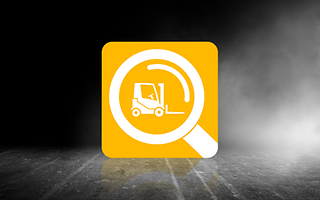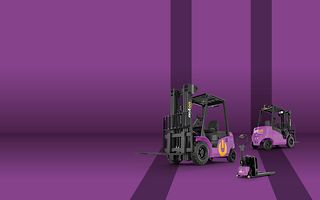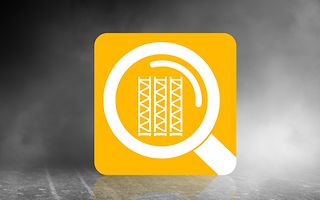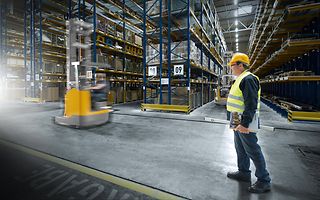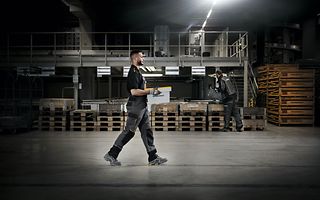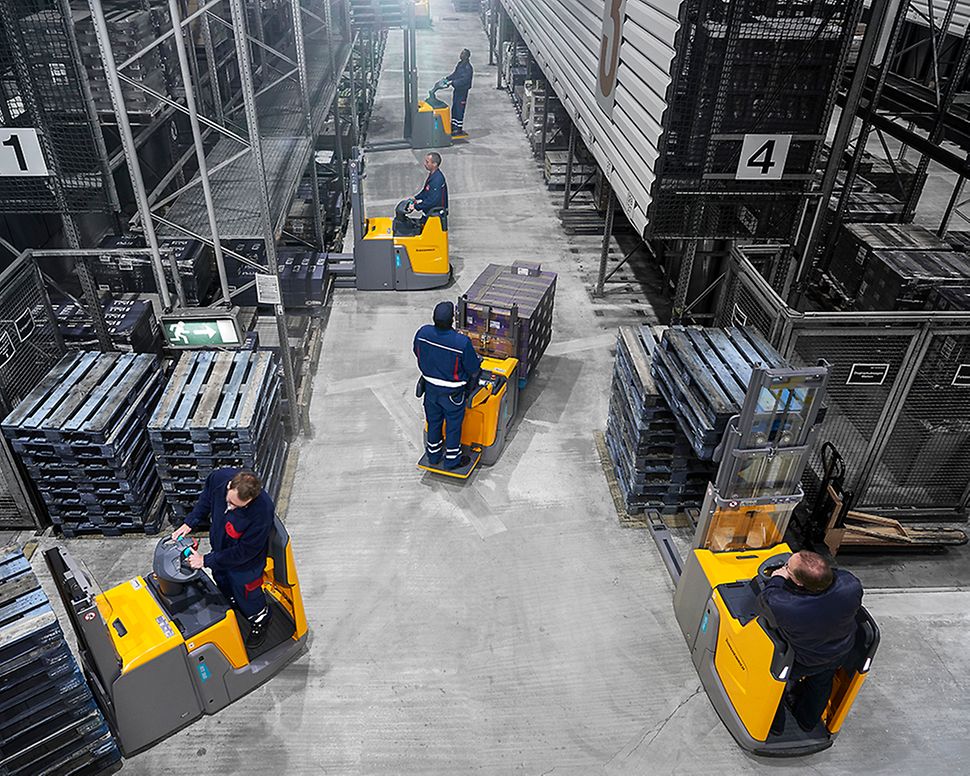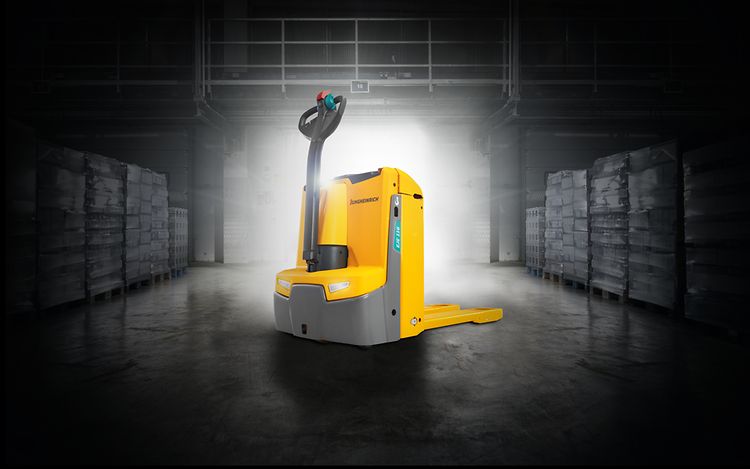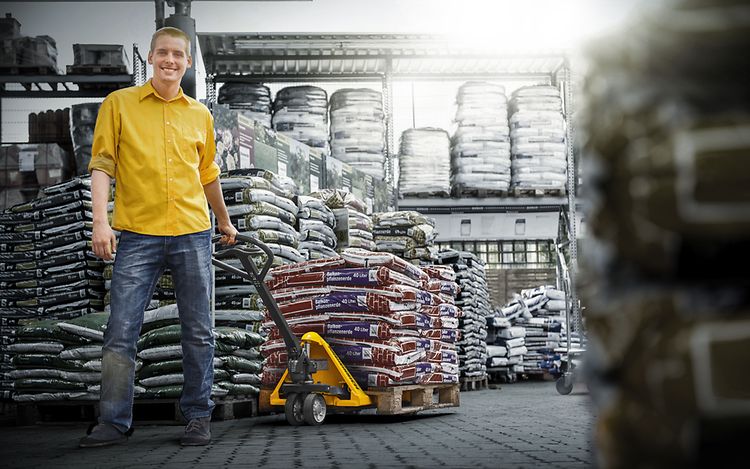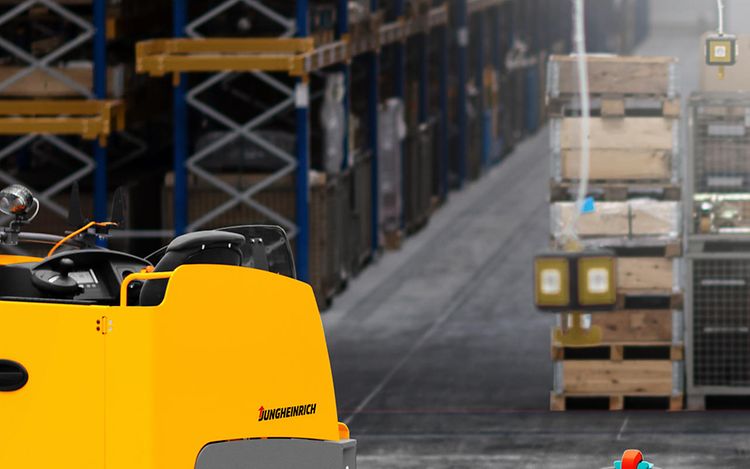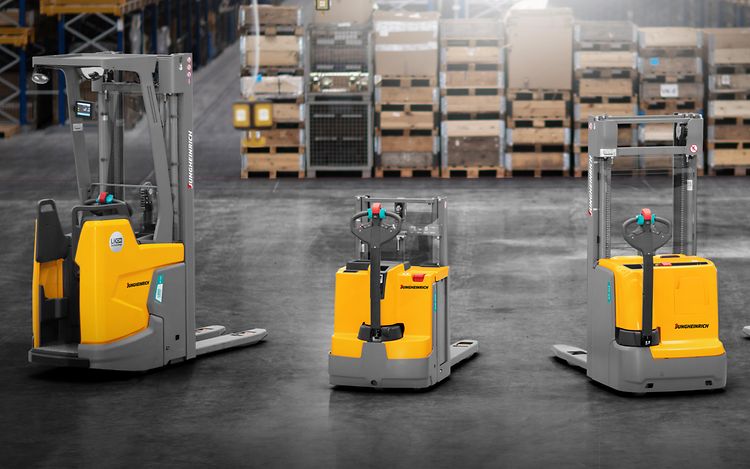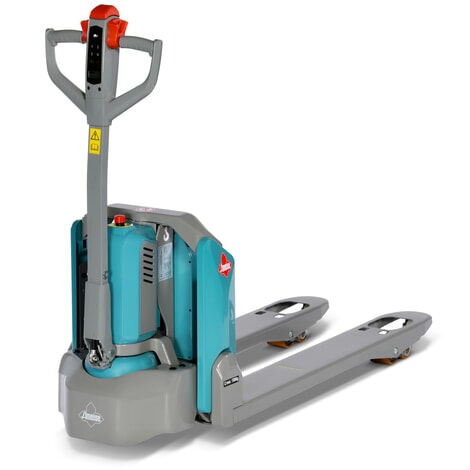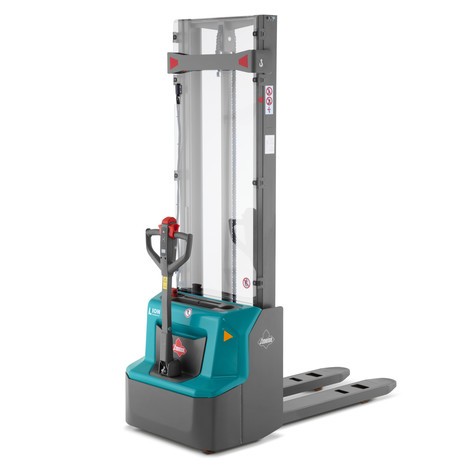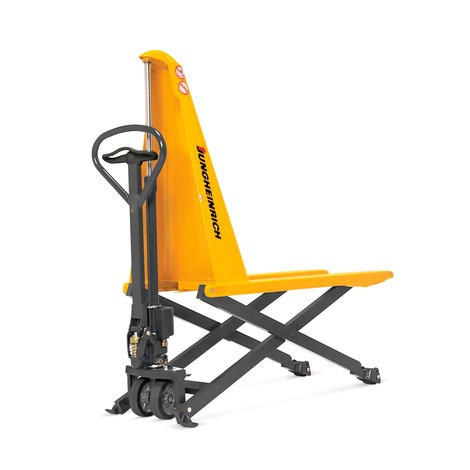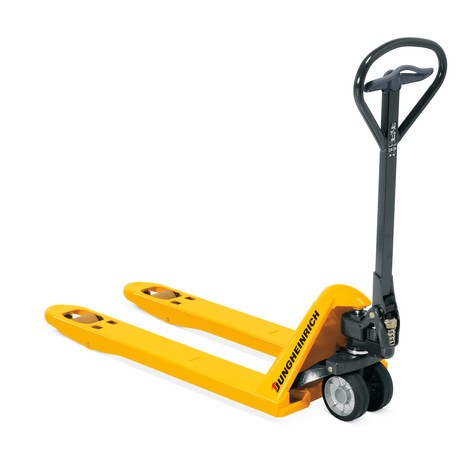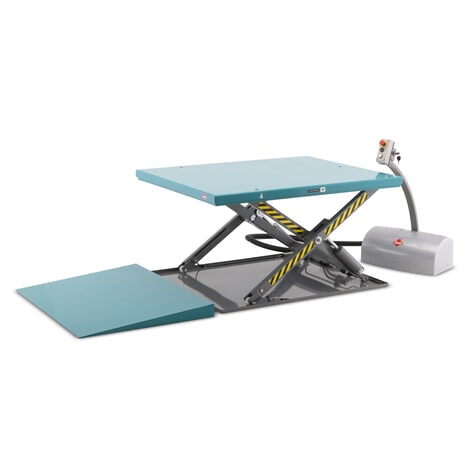Buy, lease or rent a pallet truck
You can buy many of our pallet trucks directly at a discounted price online via the Jungheinrich PROFISHOP - our B2B online shop for industry, trade and commerce - or alternatively, by requesting a product consultation with one of our specialist advisors.
We provide advice and support in the selection of the optimal lift truck and financing options for you. At Jungheinrich we make sure you get the right pallet truck, which you can finance, lease, hire purchase or long-term rent, whatever your preference, we are happy to help.
Do you need pallet trucks for temporary use at short notice - for example, during peak periods or a change in production capacity? Then you can rent pallet trucks from Jungheinrich. Our online forklift rental advisors will help you choose the right piece of equipment to suit you.
FAQ - Frequently asked questions & answers
What is a pallet truck?
A pallet truck or pallet stacker is a manually or electrically operated industrial truck for the easy transportation and, in the case of stacker models, the lifting of palletized goods, lattice boxes or similar loads.
When was the pallet truck invented?
While Jungheinrich produced one of the first pallet trucks, the Ameise®, similar devices appeared in America even earlier, as far back as the 1920s. At that time these trucks lacked a hydraulic system, which is now an essential component of the modern pallet truck. The technology developed over time and became more and more prevalent across Europe. Today the yellow Jungheinrich pallet trucks is one of the most iconic in the world.
How does a pallet truck work?
The classic pallet truck consists of a frame and two metal forks, which are equipped with load rollers and whose fork length, depending on the model, can also be particularly short or long. These forks can be pushed under pallets and other load carriers and then - depending on the model - lifted manually or electrically. The actual lifting and lowering takes place using hydraulic technology. The tiller, a long lever with handle, is used to pull or push and steer the truck. The drive itself differs depending on the design: manual for hand pallet trucks and electromotive for electric pallet trucks.
What's an Ameise?
Ameise® (The German word for Ant) is a Jungheinrich product brand, coined because of the ant's speed and ability to lift between 10 and 50 times it's body weight, that was registered in 1948 by the company's founder Friedrich Jungheinrich at the patent office. Because of its robust construction and reliable quality, Ameise® has become a colloquial symbol for pallet trucks across Germany and beyond. You can get Ameise® equipment exclusively from Jungheinrich PROFISHOP.
Why is it called a pallet truck?
Similar to forklifts, most pallet trucks have a dual fork arrangement. These forks are used to pick up, lift and then transport load-carrying items, such as pallets. The name "pallet truck" emphasizes this characteristic of the design but these trucks are used to transport a wide variety of things, not just pallets as the name suggests. Fork lengths are variable, with Jungheinrich offering multiple varieties - so you will always find the right solution for your particular application.
What's a pedestrian pallet truck?
A Pedestrian pallet truck is simply another synonym for the classic type of pallet truck. Operators of this type of equipment walk alongside the truck rather than sitting or riding on it, hence the name pedestrian. The tiller of manual truck is used to steer and lift loads, and in the case of electric trucks, it is also used for safe acceleration and braking.
Which type of pallet can be used?
At Jungheinrich you will find pallet trucks for a wide variety of industrial storage systems designed for transport, including:
- euro pallet
- Industrial pallet
- Düsseldorf pallet or display pallet
- various wooden pallets
- various plastic pallets
- CHEP pallet
- Disposable pallet
- Two-way pallet
- Four-way pallet
- returnable pallet
- IPPC range
- Stillages
All these types of pallets can be run under, lifted and transported with the right Jungheinrich pallet truck. If you are in any doubt about which variant of truck you need, contact one of our specialists who will be pleased to help you.
Who can operate a pallet truck?
Pedestrian hand pallet trucks and electric pallet trucks that don't have ride-on functionality can, generally, be operated without a special driver's license. If, on the other hand, it is not purely a walk-along device, a forklift license or industrial driver training may be required. Jungheinrich also offers driver training courses for these types of machine when you require it.
What is the difference between low and high lift?
Pallet trucks with low and high lift differ in the maximum possible lifting height. While hand pallet trucks only lift loads off the floor, high-lift trucks or stackers are equipped with a mast, which means that the loads can be lifted and stacked significantly higher.
What is the lifting capacity of a pallet truck?
The maximum lift capacity of a pallet truck varies depending on the model and construction of the device. Our hand pallet truck AM 30 for example, has a maximum weight capacity of up to 3000 kg which can be easily lifted and transported. You can view exact specifications for the load capacity of the various models we produce on our product detail pages or refer to the PDF datasheets.
How much does a pallet truck weigh?
There is no definitive answer to how heavy a pallet truck is. The weight of our pallet trucks varies significantly - depending on the type, series and model. You can, therefore, find precise information on our product detail pages and in the datasheets of the respective models.
What types of drives are there?
Pallet trucks are operated either purely manually, partially electrically or completely electrically. The same applies to their lift mechanisms, which can also be done manually or electrically. Suitable devices can be found on the following pages: hand pallet trucks, electric pallet trucks and electric pallet stackers.
What types are there?
There are a number of different designs that are optimised for different applications. In general, a distinction can be made between the following types of trucks:
Pallet trucks are also available as walk-along or ride-on devices. At Jungheinrich you will always find the optimal design for all applications. Should your individual requirements be outside of our broad range of model configurations, we will develop a solution tailored to your needs as part of our special build program.
Which pallet truck do you use for short/long distances?
Typically for short distances, usually under 30 meters, a hand pallet truck is a sufficient solution (depending on the load). In the case of frequent transport or very heavy loads, the use of our EJE electric pedestrian pallet trucks in pedestrian mode is recommended even for short distances, for improved efficiency and, above all, ergonomic and safety concerns. If you regularly cover longer distances, we advise you to use our electric ERE pedestrian pallet trucks with standing platform or our ESE electric standing / side-seat pallet trucks.
Which pallet truck is suitable for use in a damp environment?
In damp environments and/or wherever frequent cleaning with steam or water jets and aggressive cleaning agents is necessary, corrosion-resistant pallet trucks made of stainless steel are recommended. Appropriate devices can be found in our stainless steel pallet truck category. We also offer devices with hot-dip galvanizing - as a cost-effective alternative to the stainless steel version.
Are there explosion-proof devices?
Yes. As part of our special build program, you will be able to spec explosion protection for devices to fully meet your safety requirements in potentially explosive areas. Jungheinrich offers you safe solutions for using pallet trucks in challenging environments with flammable gases and vapours as well as explosive powders and dust.
Which oil to use for pallet trucks?
Special hydraulic oil is used for pallet trucks. For consistent quality and optimal functionality, we recommend our professional hydraulic oil service including the environmentally friendly disposal of the spent oil. Routinely changing the oil of your pallet truck ensures the usability and longevity of your equipment will be ensured. Our service experts will be happy to advise you.
What rollers and wheels are available?
Primarily, there are three different materials used for the rollers and wheels of a pallet truck. Nylon, polyurethane and solid rubber. These versions each have specific advantages and disadvantages and are suitable for different locations or floors. Nylon is low-wear and acid-resistant and can be used for smooth and level floors as well as in the food and chemical/pharmaceutical industries. As a disadvantage, this variant is more susceptible to impact damage. Polyurethane is considered to be very wear-resistant, smooth and quiet and is particularly recommended on hard and sensitive surfaces. Solid rubber has a higher rolling resistance but it also runs well on rough and uneven floors.
Where can I get spare parts for the pallet truck?
Should spare parts ever become necessary, you will receive original spare parts from us first hand. This maximises the lifespan of your pallet truck and delivers the best manufacturer quality with the highest performance values.
Where can I find the user manual?
With our online manual search you will be able to find the correct operating instructions for your Jungheinrich industrial truck.
Who will repair my pallet truck?
Despite first-class quality, occasionally repairs may be necessary, even for Jungheinrich pallet trucks. Our experts are there for you and help you to minimize the unproductive downtime. True to the motto "Action before reaction" you can prevent repairs in many cases with our maintenance service.
What do I need to pay attention to when purchasing?
If you want to buy a pallet truck, you need to be sure that the device meets your requirements and the conditions of use or can be configured accordingly by the manufacturer. In addition, you should avoid cutting corners on the quality, especially with the ball bearings of the load rollers and the seals of the hydraulic system, since these are considered to be particularly susceptible to failure and can be expensive to replace for supposedly cheap devices. Jungheinrich pays special attention to outstanding quality here too. When you choose Jungheinrich, you are not only choosing reliable quality, but also safety, ergonomics, long-lasting performance and high efficiency.
